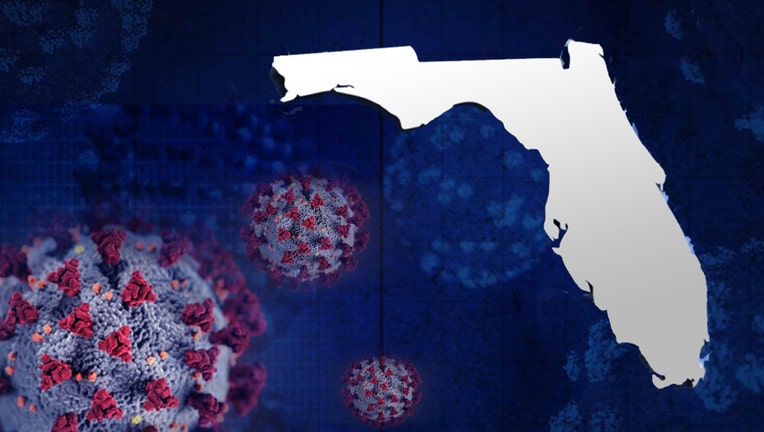Florida reports over 5,500 new COVID-19 cases, 178 more deaths after day-break in reporting numbers

ORLANDO, Fla. - The Florida Department of Health reported 5,570 new cases of COVID-19 and 178 more deaths on Sunday.
This increase reflects two-days, instead of the usual one, because the Florida Department of Health did not release its daily coronavirus case numbers on Saturday.
Officials said that the break happened because it received approximately 400,000 previously reported COVID-19 test results from Helix Laboratory, a private lab not affiliated with the state. The large size of the data file and the need to de-duplicate hundreds of thousands of results prevented the department’s automatic reporting system from processing results as it normally does.
The reporting issue did not impact individuals waiting on test results, they added.
The total number of cases since the pandemic began is now 734,491, resulting in 15,364 deaths.
RELATED: Interactive map of COVID-19 cases across Florida
If you are having trouble seeing the map or using it (especially on a mobile device), click here to load in a new window.
Florida is now in phase three of reopening with no limitations on restaurants. They must operate at a minimum of 50 percent capacity, regardless of rules by the local government.
The original plan for Phase 3 allowed for the following changes:
- Individuals older than 65 years of age and individuals with a serious underlying medical condition can resume public interactions but should practice social distancing.
- Non-vulnerable populations should consider minimizing time spent in crowded environments.
- Non-essential travel may continue.
- Employees should resume unrestricted staffing of worksites and implement the final phasing in of employees returning to work.
- Employees should resume non-essential travel and adhere to CDC guidelines regarding isolation following travel.
- Local government meetings should return to in-person quorum and public participation for local government bodies.
- Bars, pubs, and nightclubs that derive more than 50 percent of sales from alcohol should operate at full capacity with limited social distancing protocols. Businesses should maintain adequate sanitation practices. (UPDATE: Bars need local government approval to reopen to full capacity, but the state restrictions are lifted)
- Restaurants and food service establishments may operate at full capacity with limited social distancing protocols. Businesses should maintain adequate sanitation practices.
- Gyms and fitness centers should open to full capacity but should maintain adequate sanitation practices among employees and patrons during all hours of operation.
- State parks should be fully opened, including overnight accommodations. Beaches should remain fully open.
- Large venues such as movie theaters, concert halls, and bowling alleys should re-open fully with limited social distancing protocols.
- Large spectator sporting events should consider reducing capacity with limited social distancing protocols.
- Theme parks may return to normal operations with limited social distancing protocols.
- Salons, barbershops and nail salons, should operate under full capacity but should consider removing all unnecessary, frequent-touch items such as magazines and newspapers, and maintain sanitation standards.
- Retail businesses should operate at full capacity.
RELATED: Man who fought COVID-19 for months now faces lingering side effects

Fixing Florida’s unemployment system
A Democratic Florida lawmaker wants to revamp the unemployment system after many were left in the dark due to glitches in the early days of the pandemic.
Coronavirus can spread from person to person through small droplets from the nose or mouth, including when an individual coughs or sneezes. These droplets can land on objects and surfaces. Others can then contract the virus by touching these objects or surfaces, then their eyes, nose or mouth.
As stated before, symptoms of the coronavirus include fever, cough and shortness of breath. They may show in as few as two days or as many as 14 days following exposure, the Florida Department of Health says. Most people recover from COVID-19 without special treatment, but the elderly and those with underlying medical problems are more likely to develop serious illness.
If you display coronavirus symptoms, you should contact a local health organization and make them aware of your condition prior to arrival while also following specific instructions or guidelines they may have.
RELATED: Feds: Man stole $17M in COVID-19 relief, bought luxury cars, houses

District recommends some students return to classroom
Two months in and thousands of students are flunking virtual school. A disproportionate number of failing grades have been reported in Volusia County.
If you are experiencing a medical emergency, call 911 and let them know if you have been infected or believe that you may be. If you are infected, a medical professional or another authority will likely advise that you remain isolated while sick. This includes staying at home and not going into public places or large events.
Please visit the Department’s dedicated COVID-19 webpage for information and guidance regarding COVID-19 in Florida.
For any other questions related to COVID-19 in Florida, please contact the Department’s dedicated COVID-19 Call Center by calling 1-(866) 779-6121. The Call Center is available 24 hours a day. Inquiries may also be emailed to COVID-19@flhealth.gov.
RELATED: 'One step forward, two steps back': Pelosi dismisses latest White House COVID-19 aid offer

Doctors issue guidance for holiday gatherings
Doctors are seeing an increase in coronavirus patients. They have a warning for families as they prepare for the holiday season
Globally, there have been over 37.2 million COVID-19 cases, resulting in over 1 million deaths, according to John Hopkins University.
Below is an interactive John Hopkins University dashboard, showing a country-by-country breakdown of positive COVID-19 cases across the world.
MOBILE USERS: Click here to view the interactive John Hopkins University dashboard
CLICK HERE FOR COMPLETE CORONAVIRUS COVERAGE
Tune in to FOX 35 Orlando for the latest coronavirus news.

